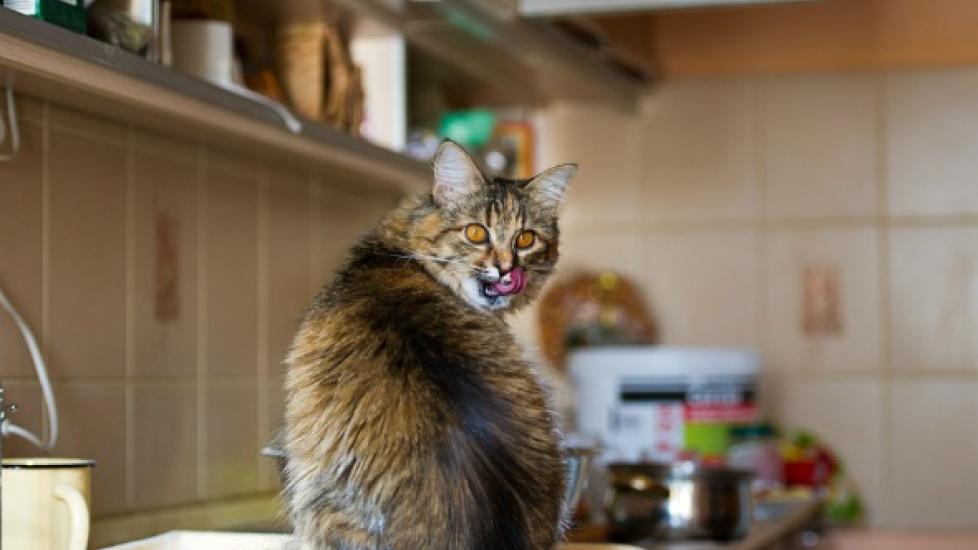Human Foods That Are Dangerous for Cats
Updated and reviewed for accuracy on February 24, 2020 by Dr. Nicole Silva, DVM
Cats are part of the family, so you may be tempted to share a few pieces of food with them here and there. Even if you never share your food, plenty of cats help themselves to something they shouldn’t.
But the truth is that many human foods are toxic or even deadly for cats.
Here’s a list of human foods that you should keep away from your feline family member, along with some advice on what to do if your cat does get ahold of one of these types of food.
Human Foods That Are Harmful for Cats to Eat
Any food not specifically formulated for cats can affect the digestive system, causing vomiting, diarrhea, or loss of appetite.
These human foods can cause serious illness in your cat.
Alcohol
Alcohol is not safe for your cat.
Cats can not only get drunk, but it can also easily cause severe liver and brain damage.
As little as a tablespoon of any form of alcohol can put an adult cat in a coma; more than that can kill them.
Chocolate
The compound in chocolate that is of major concern is theobromine. It’s in all forms of chocolate, and most concentrated in dark chocolate and unsweetened baking chocolate.
Consumption can cause heart arrhythmias, muscle tremors, or seizures. Chocolate also contains caffeine.
Caffeine (Coffee, Tea, Energy Drinks)
Coffee, tea, energy drinks, chocolate, and other caffeinated drinks and foods can cause your cat to become restless and have rapid breathing, heart palpitations, and/or muscle tremors.
Dairy Products
Cats can become lactose intolerant when they become adults. Their bodies no longer produce enough lactase to digest milk—especially cows’ milk. If ingested by cats, dairy products can cause vomiting and diarrhea.
Fat Trimmings, Raw Meat, Eggs, Fish
Please consult your veterinarian or a veterinary nutritionist first before adding these foods to your cat's diet.There is risk of vomiting, diarrhea, Salmonella or E. coli with these foods for some animals, especially when given improperly.
Fat trimmings can also cause pancreatitis in cats.
Onions and Garlic
All members of the onion family can cause problems if eaten in sufficient quantity.
A small amount of onion or garlic in some sauce is not likely to cause problems. However, eating a clove of garlic or a green onion may cause digestive upset.
Eating any type of onion on a regular basis could cause anemia.
Baby Food
Baby food made from meat is often seasoned with onion or garlic, so it should not be fed to cats.
Tuna
Tuna as an ingredient in commercially produced cat food is perfectly fine for cats.
However, tuna sold for human consumption may cause digestive upset when given as an occasional treat in small amounts.
It can even cause a painful condition called steatitis, or inflammation of the body's fat, when fed to cats on a regular basis. Tuna has too much unsaturated fatty acid and does not have sufficient vitamin E or other antioxidants, whereas commercial cat foods usually supplement vitamin E.
What to Do If Your Cat Eats a Food That’s Toxic
-
If you suspect your cat ate any of these foods, try to determine how much they may have eaten.
-
Call your veterinarian for specific advice; in some cases, small quantities are not likely to be a problem, but larger quantities may require you to take her in to see your veterinarian.
-
If your veterinarian is unavailable or unequipped to handle the situation, call the nearest animal hospital or the Pet Poison Helpline at 1-855-213-6680. This is especially important if your cat is displaying symptoms such as muscle tremors or repeated vomiting.
Treatment for Cats That Eat Harmful Food
For cats, treatment involves supportive care until symptoms resolve. This may involve hospitalization, intravenous fluids, monitoring of organ function via repeated blood testing, and other measures as indicated by the specific circumstances.
Tips for Preventing Your Cat From Eating Dangerous Foods
The best prevention is to keep human food out of reach of your cat.
If you feel the urge to give your cat a food treat, then give them one that’s actually made for cats, and in moderation. There are plenty of exciting food treats, like freeze-dried meat, that your cat will love. Just remember that treats are part of your cat’s daily calorie intake.
